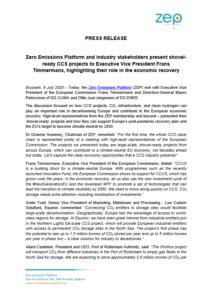PRESS RELEASE – ZEP and industry stakeholders present shovel-ready CCS projects to EVP Timmermans
Brussels, 9 July 2020 – Today, the Zero Emissions Platform (ZEP) met with Executive Vice President of the European Commission Frans Timmermans and Directors-General Mauro Petriccione of DG CLIMA and Ditte Juul-Jørgensen of DG ENER.
The discussion focused on how CCS projects, CO2 infrastructure, and clean hydrogen can play an important role in decarbonising Europe and contribute to the European economic recovery. High-level representatives from the ZEP membership and beyond – presented their ‘shovel-ready’ projects and how they can support Europe’s post-pandemic recovery plan and the EU’s target to become climate-neutral by 2050.
Dr Graeme Sweeney, Chairman of ZEP, remarked: “For the first time, the whole CCS value chain is represented jointly at a meeting with high-level representatives of the European Commission. The projects we presented today are large-scale, shovel-ready projects from across Europe, which can contribute to a climate-neutral EU economy, not decades ahead but today. Let’s capture the clean economy opportunities that a CCS industry presents!”
Frans Timmermans, Executive Vice President of the European Commission, stated: “CCUS is a building block for a climate-neutral Europe. With programmes such as the recently launched Innovation Fund, the European Commission shows its support for CCUS, which has grown over the years. In the economic recovery, let us also use the new investment cycle of the #NextGenerationEU and the revamped MFF to promote a set of technologies that can lead the transition to climate neutrality by 2050. We need to move along quickly on CCS. CO2 storage needs extra attention including mobilisation of investments.”
Grete Tveit, Senior Vice President of Marketing, Midstream and Processing – Low Carbon Solutions, Equinor, commented: “Connecting CO2 emitters to storage sites would facilitate large-scale decarbonisation. Geographically, Europe has the advantage of access to world-class regions for storage. At Equinor, we have seen great interest from industrial emitters join in the Northern Lights full-scale CCS project, which will provide European industrial emitters with access to permanent CO2 storage sites in the North Sea. The project’s first phase has the potential to see up to 1.5 million tonnes of CO2 stored per year and up to 5 million tonnes per year in phase two – a clear solution for industry to decarbonise.”
Allard Castelein, President and CEO, Port of Rotterdam Authority, said: “The Porthos project will transport CO2 from different industries in the Port of Rotterdam to empty gas fields in the North Sea for storage. We are expecting to store approximately 2.5 million tonnes of CO2 per year. The shared infrastructure for transport and storage reduces the costs per tonne. Projects like this are essential to realise the Paris Agreement goals.”
Jon Morrish, Member of the Managing Board of HeidelbergCement, stated: “For the cement industry, which is at the fundament of the European economy, CCS represents in our view a not to be missed route to decarbonisation and can ensure European industrial competitiveness in international markets. Two of our projects focus on the application of carbon capture in Eastern Europe, which is often not regarded as a potential region for storing carbon.”
ZEP put forward a set of policy asks for EVP Timmermans and the European Commission to emphasise what is now needed to ensure the development of cross-border CO2 transportation infrastructure to drive CCS projects and large-scale decarbonisation.

